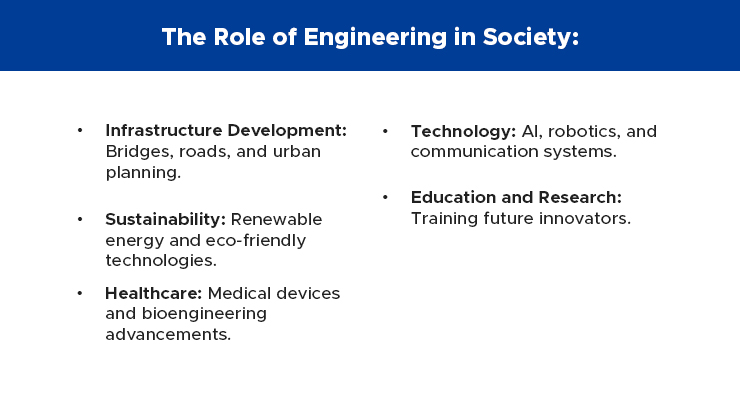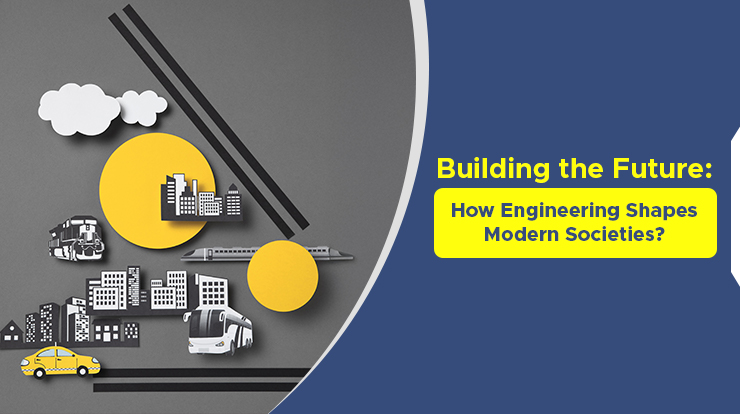From the bridges we cross to the smartphones in our hands, engineering is everywhere, transforming lives and paving the way for progress. Have you ever stopped to think about the profound impact of engineering on your daily life?
Beyond technology, engineering from the best colleges for B.Tech in Rajasthan shapes modern societies by solving critical challenges, enhancing the quality of life, and driving economic growth. But what makes the role of engineers in society so indispensable?
In this blog, we will explore how engineering drives change, the role of engineers in society, and the importance of engineering in society. If you are considering an education in engineering, Sangam University is one of the top universities in Rajasthan, preparing the innovators of tomorrow to tackle these challenges head-on.

The Role of Engineers in Society: Building Foundations of Progress
Engineers are problem-solvers at their core, creating solutions that improve daily life, sustain economies, and protect the planet. Sangam University, one of the top colleges for B.Tech in Rajasthan believes that its contributions extend beyond the obvious technologies to include infrastructure, healthcare innovations, and environmental sustainability.
Key Contributions of Engineers
- Infrastructure Development:
- Designing roads, bridges, and buildings that connect communities.
- Ensuring safety and longevity through cutting-edge technologies.
- Healthcare Innovations:
- Developing life-saving medical devices and systems.
- Enhancing diagnostics and treatment through bioengineering.
- Environmental Sustainability:
- Implementing renewable energy systems.
- Designing sustainable buildings and reducing carbon footprints.
- Technological Advancements:
- Revolutionising communication with smartphones and the internet.
- Enabling space exploration and artificial intelligence.
Did you know? Some of the most significant milestones in human history, from the Industrial Revolution to the digital age, were driven by engineers. Their ability to envision and implement change makes them essential for societal development.
How Engineering Shapes Modern Societies?
Engineering from the best B.Tech college in Bhilwara is not just about machines or structures; it’s about making life better for everyone. Here’s how:
1. Enabling Connectivity and Communication
Engineers have revolutionized how we interact with the world. Thanks to advancements in telecommunications and transportation, societies are more connected than ever. High-speed trains, robust internet infrastructure, and advanced aviation systems are just a few examples.
2. Improving Quality of Life
From clean water systems to efficient healthcare technologies, engineering ensures essential services reach the masses. Civil engineers create sustainable urban environments, while electrical engineers develop energy-efficient technologies that make life more comfortable.
3. Driving Economic Growth
The role of engineers in society includes fostering innovation, which in turn creates jobs and drives industries forward. Cutting-edge engineering solutions have enabled industrial automation, renewable energy production, and groundbreaking research, contributing to national economies.
4. Ensuring Sustainability
Climate change is one of the most pressing challenges of our time and engineers from the best B.Tech university in Rajasthan are at the forefront of the fight. They are developing green technologies, waste management systems, and renewable energy solutions to create a sustainable future
The Importance of Engineering in Society
1. Solving Complex Problems
Whether it’s tackling traffic congestion or finding alternatives to fossil fuels, engineering provides practical solutions to some of society’s most pressing issues.
2. Shaping the Future
Engineering from the top engineering college in Rajasthan isn’t just about responding to current needs—it’s about anticipating the future. Fields like artificial intelligence, robotics, and nanotechnology are shaping how we live, work, and interact.
3. Empowering Education
Institutions like Sangam University recognised as a top private university in Rajasthan, are vital in nurturing the next generation of engineers. Their programs emphasize not only technical skills but also ethical and social responsibility, preparing students to contribute meaningfully to society.
Choosing the right institution is crucial for aspiring engineers. A university with a comprehensive curriculum, state-of-the-art facilities, and industry tie-ups can set the stage for a successful career.
Conclusion
Engineering is the backbone of modern societies, continuously pushing boundaries and improving lives. From building infrastructure to tackling global challenges, the importance of engineering in society cannot be overstated.
As we look ahead, the role of engineers in society will only grow, shaping a future that is more connected, sustainable, and innovative. Institutions like Sangam University, the best university in Rajasthan, play a pivotal role in this transformation by nurturing skilled and ethical engineers who are ready to lead the way.
Shape your future while shaping the world. Enroll in Sangam University, and gain the skills to make a lasting impact. Explore programs designed to prepare you for a dynamic career in engineering and become part of the solution to society’s challenges.
FAQs
Why is engineering important in society?
Ans. Engineering solves critical problems, improves quality of life, and drives economic and technological progress.
How do engineers impact daily life?
Ans. Engineers design infrastructure, create technologies, and develop solutions that make life more comfortable, safe, and efficient.
What are some examples of engineering’s contributions to sustainability?
Ans. Renewable energy systems, eco-friendly construction, and waste management technologies are all significant contributions.
How can I pursue a career in engineering?
Ans. Enroll in a reputable institution like Sangam University, a top private university in Rajasthan, that offers a well-rounded engineering program.
What makes Sangam University stand out for engineering education?
Ans. It offers a multidisciplinary approach, and industry-focused curriculum, and a strong emphasis on sustainability and innovation.


